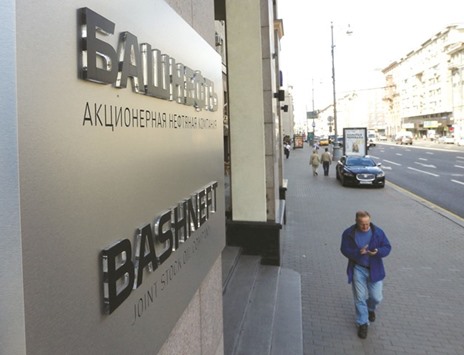A power struggle within President Vladimir Putin’s inner circle may lie behind Russia’s surprise decision to delay selling a stake in Bashneft, its biggest asset sale in a decade, according to analysts.
“There was an internal conflict among the elite over who would get the assets that had potential long-term consequences,” Yevgeny Minchenko, head of the Moscow-based International Institute of Political Expertise, said. Rosneft chief Igor Sechin, Lukoil’s billionaire head Vagit Alekperov and smaller regional groups were all unable to convince the Kremlin that they deserved the asset, “so the issue was kicked down the road,” he said.
Among reasons for the postponement “as we see it, is Rosneft’s Sechin insistence that if he can’t have Bashneft, no one will,” Luis Saenz, head of equity sales and trading at BCS Financial Group in London, said in an e-mailed note.
The government planned to sell as much as 50.08% of Bashneft as early as next month to help plug the budget deficit after the collapse of crude prices cut into the state’s biggest source of tax revenue. Rosneft, the state-owned energy giant run by Sechin, Putin’s longtime ally, was weighing a bid for the smaller oil producer, even though the government opposed its participation in the sale, according to two people with direct knowledge of the matter, citing a decision by the Russian president.
The deal, valued at as much as 315bn roubles ($4.9bn), had also drawn the interest of Lukoil, Russia’s second biggest producer, and would have been Russia’s largest since Rosneft’s $10.7bn initial public offering in 2006.
A Rosneft spokesman declined to comment on the delay, adding that the company “did, does and will always fulfil orders of its controlling shareholder.” “The prime minister made the decision, which was approved by the president, to move the Bashneft privatisation to a later date,” Premier Dmitry Medvedev’s spokeswoman Natalya Timakova said by phone late Tuesday, without elaborating. The sale won’t happen this year, the news website RBC reported, citing a person it didn’t identify. The postponement brought into question the government’s commitment to its privatisation programme, including plans to sell almost 20% of Rosneft this year, according to Pavel Laberko, a London-based money manager at Union Bancaire Privee, which oversees about $90bn.
“I have always been sceptical of the government’s privatisation plan as having a lot of talking and not much happening,” Laberko said. “The government overall continues to maintain and expand its control over the economy.”
The government will resume work on selling the Bashneft stake after it’s disposed of shares in Rosneft, First Deputy Prime Minister Igor Shuvalov said last week.
While there’s “significant” interest in Bashneft’s shares, the Rosneft sale is the priority now, he said. “Cancelling the deal at the last gasp is not supportive of Russia’s investment climate, and undermines the attractiveness of Russian equities,” Aton Capital said in a e-mailed research note. Based in Russia’s Bashkortostan region north of Kazakhstan, Bashneft pumps about 425,000 barrels a day, or 4% of the country’s output. It was nationalised in 2014 after the government seized shares held by Vladimir Evtushenkov’s holding company AFK Sistema amid a money-laundering case that was later dropped.
Russia resumed its privatisation programme last month by selling a 10.9% stake in Alrosa, the biggest divestment of a state asset since the government’s earlier reduction of its stake in the world’s largest rough-diamond producer almost three years ago. Besides Bashneft and Rosneft, the state has plans to offer shares in shipping company Sovcomflot soon.
“The government decided not to stupidly hand over Bashneft to Sechin under the flag of ‘privatisation’ and took a time-out,” Vladimir Milov, an opposition figure who was deputy energy minister in 2002, said in a post on Facebook.

People walk past the headquarters of Bashneft in central Moscow. A power struggle within President Vladimir Putin’s inner circle may lie behind Russia’s surprise decision to delay selling a stake in Bashneft, its biggest asset sale in a decade, according to analysts.
